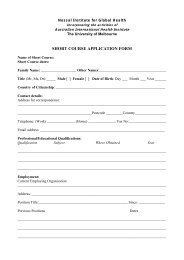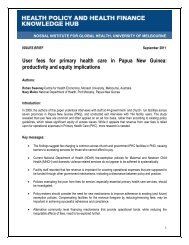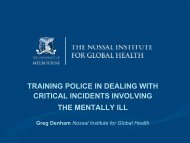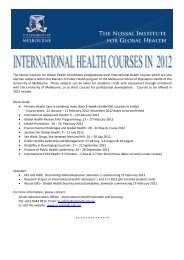AN INTRODUCTION TO MENTAL HEALTH - The Nossal Institute for ...
AN INTRODUCTION TO MENTAL HEALTH - The Nossal Institute for ...
AN INTRODUCTION TO MENTAL HEALTH - The Nossal Institute for ...
Create successful ePaper yourself
Turn your PDF publications into a flip-book with our unique Google optimized e-Paper software.
Reasons why a person with a mental disorder may have physical symptoms:<br />
• Worry causes a person to tense their muscles <strong>for</strong> long periods which makes the muscles<br />
tender and painful.<br />
• Chemical changes in the body related to mental disorders such as excess worry cause<br />
the heart to beat faster, the person may experience palpitations and chest pain.<br />
• A person with excess worry or panic may start to breathe rapidly leading to dizziness,<br />
tingling or a choking feeling.<br />
• A person with a mental disorder may prefer to see a health worker about a physical<br />
symptom rather than a mental one because of the stigma associated with mental<br />
disorders.<br />
• People with mental disorders may not realise they have a mental disorder but they do<br />
know that they are not feeling ‘their normal self’.<br />
How to help a person with multiple physical complaints<br />
1. Assess the risk of harm to self or others<br />
• Make sure that the person is not suffering from a physical illness, if you have any concern<br />
that the symptoms may be caused by a physical illness, refer the person to a doctor.<br />
2. Listen without judgement<br />
• Spend some time talking with the person to find out the type of complaints<br />
• It is helpful to use general questions such as “have you been worried about anything<br />
lately?” to find out if the person is having problems that may be contributing to their<br />
physical symptoms.<br />
3. Give reassurance and in<strong>for</strong>mation<br />
• Stress and worry often contribute to unexplained physical symptoms and if the person<br />
is able to reduce stress and worry this will help improve the physical symptoms.<br />
4. Encourage the person to get appropriate help<br />
• Explain that emotional stress often leads to physical symptoms, which in turn can make<br />
emotional stress worse.<br />
• Treatment is needed to help the underlying problem and not just the symptoms, <strong>for</strong><br />
example stress caused by money problems may contribute to headaches and body<br />
aches, finding a solution to the money problems will help treat the headaches and<br />
body aches.<br />
• Vitamins and pain killers will not help unless there is evidence of malnutrition or a painful<br />
physical illness. 2<br />
5. Encourage self help treatments<br />
• Relaxation exercises such as slow breathing may help the person manage stress<br />
52<br />
<strong>AN</strong> <strong>INTRODUCTION</strong> <strong>TO</strong> <strong>MENTAL</strong> <strong>HEALTH</strong>
















